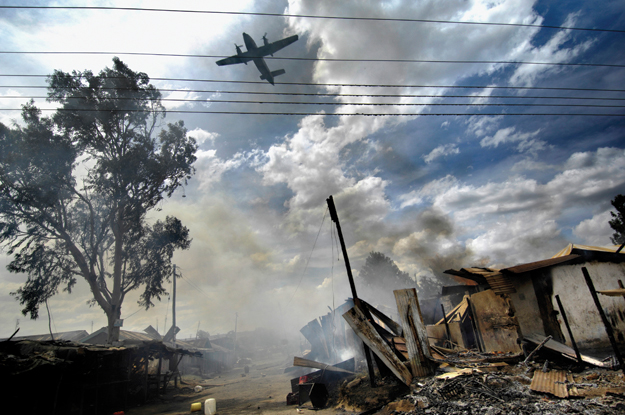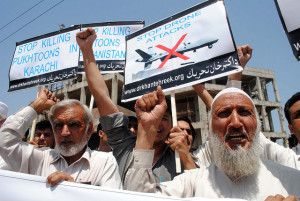by James A. Russell
With the disappearance of war between developed states in the post-World War II era, policing intra-state violence on land and trying to punish so-called rogue states constitutes the main security problems facing the international community.
As the world’s sole military power capable of global power projection, many of these problems invariably end up in America’s Inbox. The United States receives calls from various quarters for military intervention around the world in Syria, Iran, Mali and other global hotspots. These calls aren’t going away any time soon, despite this country’s exhaustion after a decade of war. But the world’s problems won’t wait while we lick our wounds and try to take a breather.
Intervention advocates invariably propose that we establish no-fly zones and/or launch our missile-armed drones over their areas of focus. They argue that policing people on the ground from 15,000 feet presents a low-cost, pain-free (at least for us) alternative to putting boots on the ground.
The western intervention in Libya is held up as an example of the benefits of this approach. However, as recent events there indicate, it’s clear that the struggle for political power in Libya has only just begun. The future direction of the country is at best uncertain.
The idea that the United States and its allies can police the world’s ruffians from above is dangerously misguided. It stems from repackaged failed ideas that have been repeatedly and unsuccessfully tried over the last century.
America’s love affair with shooting at the enemy from the sky above and the associated belief that the resulting destruction can somehow control politics on the ground goes back to the early 20th century, when strategists considered the potential benefits offered by airplanes as an instrument of war.
Western armies had fought to a bloody and protracted stalemate in World War I that slaughtered a generation on the fields of France, just as the airplane arrived to survey the carnage below. Shortly thereafter, Italian General Guilio Douhet offered his theories of airpower that cast the airplane as a revolutionary weapon that could destroy enemies on the ground invulnerable from attack. He believed the advent of airpower offered the prospect that armies might not have to close with one another in their bloody and awful embrace to achieve victory.
Douhet’s theories found favor with many, including General Hap Arnold, who then helped mastermind the allied strategic bombing campaign in World War II. Arnold spearheaded efforts to create the United States Air Force as a separate military service drawing upon Douhet’s concepts and adopting the broader mission of long-range strike warfare that, at the time, primarily involved dropping nuclear bombs on the Soviet Union.
But the proponents of bombing from above had several problems. The first was the accuracy of the bombs. As revealed in the Strategic Bombing Survey after World War II, it turned out that our bombers missed most of the military targets they were aiming at, belying one of the promises of airpower advocates. With a few exceptions, most of the military targets actually hit by allied bombers did little to impede Germany’s overall war effort.
Second, airpower advocates greatly miscalculated the political impact of the bombing raids on the enemy. Instead of undermining the enemy’s will to fight, bombing raids on civilian populations had the opposite effect. Hitler’s bombing of London strengthened England’s resolve. The allied campaign against German cities had a similar effect. Twenty years later, the United States unsuccessfully attempted to undermine North Vietnam’s commitment to conquer South Vietnam despite blasting away at the North with more bombs than had been dropped in all of World War II.
These broader lessons, however, were lost on American airpower strategists who were intent on cementing the institutional power of the Air Force and its budgets, and on building the “global strike” warfare complex that today is a centerpiece of the American military.
In the 1990s, advocates of the revolution in military affairs like Andy Marshall, the Pentagon’s long-time director of Net Assessments, argued that the digitization of the battlefield along with a new generation of stand-off weapons (including drones) had solved the accuracy problem, making it possible for us to destroy enemy targets with impunity from above while also minimizing the collateral damage and killing of innocent civilians. Like the airpower theorists of an earlier generation, they argued that the selective destruction of enemy targets from above meant that we didn’t have to close with our enemies on the ground in protracted and costly wars.
The United States unleashed the full force of its strike warfare complex in Afghanistan and Iraq to deadly effect. But the strike complex and its precision targeting from above did not end these wars quickly, and we discovered the hard way that there was no substitute for combat outposts manned by soldiers and marines in the countless and obscure nooks and crannies of these countries.
Moreover, despite the promise of these more accurate weapons, we still killed plenty of innocent civilians. Thousands of Iraqi and Afghan civilians were inadvertently killed in the crossfire between the United States and its enemies on the battlefield. As shown by McClatchey, drone strikes authorized by President Obama in Afghanistan and Pakistan have resulted in the deaths of scores of innocent people that had nothing to do with al-Qaeda.
Trying to deal with instability on the ground by flying around above it and/or firing down upon it is like pounding a square peg into a round hole. Civil wars are political disputes between parties that either can’t or won’t settle their differences peacefully. This is as true in Mali as it is Syria or anywhere else.
Those arguing for interventions in these disputes must in parallel decide which side to back. Who would we rather have in control in Syria? A Hezbollah/Iran-backed regime of Bashar al-Assad, or another militant version of the Muslim Brotherhood that might lay waste to Syria’s diverse ethnic and religious communities.
Intervention in these local disputes means picking a side and living with the consequences. It also means intervening on the ground with the Marines and/or the Army if we hope to shape the outcome of the struggle.
Our recent record in picking worthy winners in these wars is not great. The United States backed Nouri al-Maliki in Iraq — a choice that has had mixed results for American interests. We’ve backed Hamid Karzai in Afghanistan — a leader that has stolen millions of taxpayers dollars over the last decade and not attracted the political allegiance of Afghans despite our best efforts. What makes us think we’ll have any better luck picking a winner in Syria or anywhere else?
Policing recalcitrant states like Iran by shooting at it from above is a similarly hopeless endeavor. Repeated calls for what amounts to a protracted bombing campaign against Iran to delay its nuclear program are misguided and would only strengthen Iran’s resolve to build its own nuclear weapon. Alternatively, imposing our will on Iran by invasion and occupation is simply not worth the costs and out of the question politically.
These are the unfortunate realities of our 21st century security problems that cannot be answered by the theories of Douhet or the revolution in military affairs. Effective policing means ground intervention with enough force to impose our will on either the warring parties or on the recalcitrant state(s) and being prepared to accept the human, monetary, and strategic costs (as well as potential benefits!) of that action.





